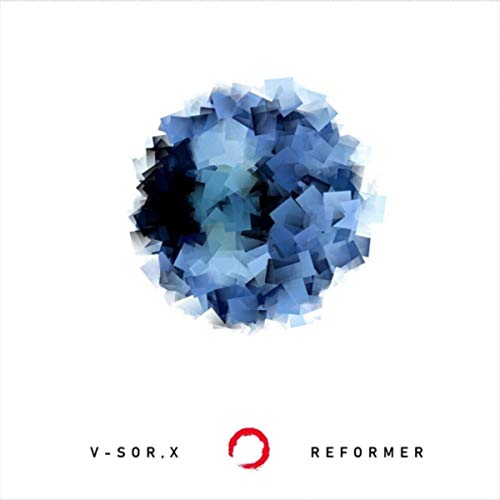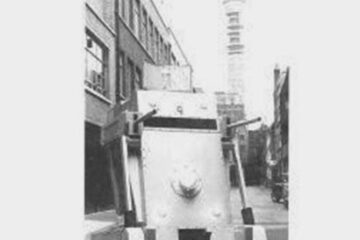For your head, your heart and your feet
V-Sor,X refer to themselves as “alternative synth-pop” and their combination of synths with some guitar and bass certainly gives their music a much more organic sound than many of their contemporaries.
As an outfit, V-Sor,X (pronounced “vee sore ex”) have roots in that early 1980s post-punk scene, having released their 7″ single ‘Authors 2’ back in 1982. Based in Derbyshire, the outfit also have associations with the worldwide independent compilations scene, which has helped to build their audience over several years.
V-Sor,X’s Morgan Bryan has tracked an intriguing musical career through a variety of groups (including Paris Working, who supported Duran Duran at Wembley Arena). He’s also taken on the role as keyboard technician, working at Prince’s Paisley Park studio and toured with Adamski.
Along the way, a heady soup of influences has directed his musical ambitions drawing from the likes of early Human League, OMD, Harold Budd, Cocteau Twins, Dalek I Love You, John Barry, The Smiths, The Cure and Wire.
Reformer, which is actually V-Sor,X’s third studio album, presents a collection of tunes with a heavy electronic foundation (including a few minimal nods), but also a warm, earthy feel to the compositions. Much of this is down to the gritty guitar elements which are distorted and treated until there’s an almost seamless connection with the synths. The vocal elements, meanwhile, are always front and centre, Morgan Bryan’s voice having a weighty quality to it that at times brings to mind the likes of Jim Morrison (particularly on the likes of ‘Dragged’ and ‘Getting Back’). It’s a mesmerising combination that manages to sound familiar, yet unique at the same time.
The album has also had a long gestation period, with some elements dating back to 2017. But Bryan (vocals, guitar, synths) and Ian Rowland (bass guitar) have still crafted an album that has a style that flows together as a satisfying whole.
Opening track ‘Dragged’ (which has a ‘wobbly’ intro that seems to throw a nod to The Smiths’ ‘How Soon Is Now’) offers an engaging intensity, ramped up by Bryan’s emphatic “I’m alive”, which repeats across the song’s machine-like rhythms.
The brooding qualities of ‘Grey + White’ have a more sedate arrangement of warmer tones. Bryan’s lyrical journey here seemingly offering commentary on contemporary culture (“With the ghosts and gods and other fictions, all used to rule a hate addiction”).
Compositions such as ‘Elektronisch’ have a crunchy goodness to them, an almost physical presence of electronic layers, here augmented by captivating vocal samples delivering mesmerising moments (“Pop, click, whirr and tick”).
Meanwhile, ‘The Return’ has a more moody quality with its twilight narrative exploring a “world distorted by the dimmed street lights” and the “smell of drains, stale and rotten.” The stark electronic melodies suggest Kraftwerk, giving the whole composition a suitable synth sheen.
On ‘Getting Back’, there’s sharper edges employed for a buzzy workout that unfolds into one of the album’s best moments. The distorted guitar licks give this number a raw quality, while Bryan snarls a driving vocal (“If you think your best years have gone by/There’s not much hope for you inside”).
At roughly the halfway point, the electronic indulgence of instrumental ‘Jumping And Jigging And Energised’ gives the album a nice breakpoint. Then it’s straight into ‘That’s Quite Enough’ where Bryan ruminates on thoughts of blame, guilt and nostalgia (“The past no longer holds charm for me”). It’s electronic percussion clicks and purrs as subtle choral effects drop in and out.
Closing the album out, ‘Industry’ offers a meditation on a life’s adventure and the harsh realities of making your way through it (“In the push and shove, no time for love”). The insistent electronic rhythms battle it out with some fine guitar work while the lyrics are delivered with a flatness that still somehow lands an effective punch.
There’s similarities here with the work of Tenedle, particularly in both that narrative thrust, strong visual ideas and a willingness to utilise a broader range of instrumentation. But V-Sor,X overall has a more spiky, raw feel to the tunes on Reformer and the heavy use of electronics gives it, perhaps, a more weightier resonance.
Reformer is an intriguing album that works its particular magic on the listener to full effect after a few spins. It also manages to side-step any temptation to employ pastiche or any over-used homage to classic synth-pop tropes. Yet, it retains a feel and temperament that draws from a history of electronic music.
Reformer is out now on the Dox Music label.










